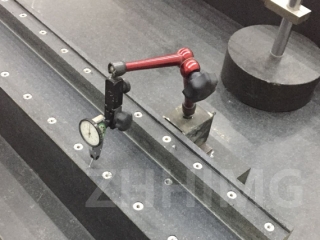Coordinated measuring machines, or CMMs, are high-precision measuring tools used to measure the physical dimensions of an object. A CMM consists of three individual axes that can rotate and move in different directions to take measurements of an object's coordinates. The accuracy of a CMM is paramount, which is why manufacturers often construct it out of materials like granite, aluminium, or cast iron to ensure the stability and rigidity needed for accurate measurements.
In the world of CMMs, granite is one of the most common materials used for the base of the machine. This is because granite has exceptional stability and rigidity, which are both essential for precision measurement. The use of granite in the construction of CMMs can be traced back to the mid-twentieth century when the technology first emerged.
Not all CMMs, however, use granite as their base. Certain models and brands may use other materials like cast iron, aluminum, or composite materials. However, granite remains a very popular choice among manufacturers because of its superior properties. In fact, it is so prevalent that most consider the use of granite as an industry standard in the manufacturing of CMMs.
One of the significant factors making granite an excellent material for CMM base construction is its immunity to temperature changes. Granite, unlike other materials, has very low thermal expansion rates, making it resistant to changes in temperature. This property is essential for CMMs because any changes in temperature can affect the machine's accuracy. This ability is especially crucial when working with high-precision measurement of small components such as those used in the aerospace, automotive, and medical industries.
Another property that makes granite ideal for use in CMMs is its weight. Granite is a dense rock that offers excellent stability without requiring additional bracing or supports. As a result, a CMM made of granite can withstand vibrations during the measurement process without affecting the accuracy of the measurements. This is especially important when measuring parts with extremely tight tolerances.
Furthermore, granite is impervious to most chemicals, oils, and other industrial substances. The material does not corrode, rust or discolor, making it easy to maintain. This is significant in industrial settings that require frequent cleaning or decontamination for sanitary purposes.
In conclusion, the use of granite as a base material in CMMs is a common and popular practice in the industry. Granite provides an excellent combination of stability, rigidity, and immunity to temperature changes that are essential for the precision measurement of industrial components. Although other materials like cast iron or aluminum can serve as a CMM base, granite's inherent properties make it the most preferred choice. As technology progresses, the use of granite in CMMs is expected to remain a dominant material due to its superior properties.
Post time: Mar-22-2024

